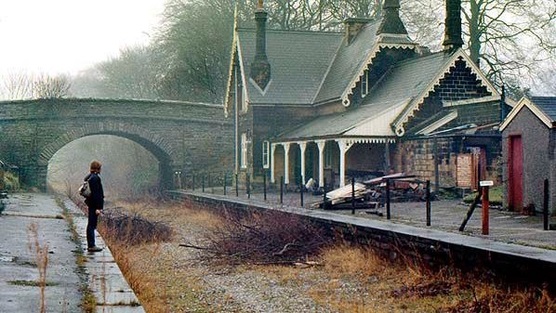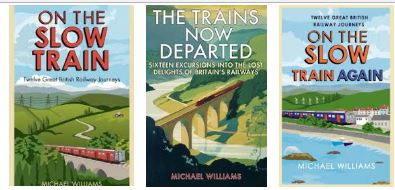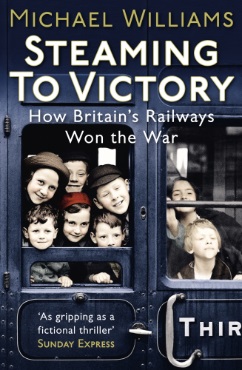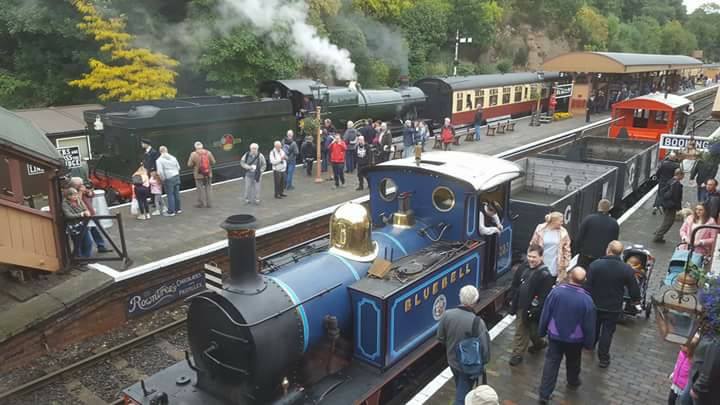|
With a certain irony, Michael's talk on September 15th was delayed slightly because Marylebone Station in London was shut and he had to hot-foot it to Paddington, having to stand for some of the journey to Oxford to give his talk, called....The Joy of Railways. However, Michael offered a great deal of positive evidence to counter-balance his experience that night - and to show that the romance of the railways is still very much alive.
He told us that the days are long gone of railway fans being derided as rivet-counters and mocked by comedians. A love of railways has widened to men and women of all ages and, for many, it may be linked to the nostalgic image of the country branch line with a wheezing old engine, milk churns on the platform and the porter's cat slumbering in the station seat. He added that, like a deep love affair, it can defy explanation and the connection between the sight of a railway engine and a deep feeling of satisfaction for many people eludes rational analysis. More evidence of the allure, he said, could be found in the crowds that turned out along the lineside for the Flying Scotsman when it came back into service last year.

Michael suggested the fascination with the railways appears to develop at a young age and pass through the generations - how else, he asked, is it possible to account for children still thrilling to the implausible adventures of quaint old steam engines with funny faces - like Thomas the Tank Engine - written by a fusty provincial clergyman in the 1950s? Every year, Michael said he made a pilgrimage with his young son to the National Model Railway Exhibition in Birmingham - and it is not full of men with anoraks carrying flasks and wearing enamel badges, but thousands of ordinary families celebrating what is now the country's biggest indoor hobby.
Similarly, every weekend, he added, families turn out to visit one of Britain's preserved railways (numbering over a hundred), carrying six million passengers a year and employing 20,000 staff and volunteers. And every weekend over the summer, thousands have gathered at trackside to watch a mainline steam express train pass by - further proof that nostalgia still rules in the age of fast trains that routinely whisk passengers at over 200 mph, such as the German ICE-2.
Michael thought our love of the railways has basic elements, such as the British inventing this form of transport, with great heroes of the railway age like Stephenson, Trevithick and Brunel. He claimed that so many aspects of the railway travel are superior - viewing the world from the carriage window, whilst conversing with another passenger, and affording a completely different perspective from any other form of transport....plus, of course, the alluring idea of meeting someone on the journey - that "Stranger on the Train". As Sir John Betjeman once said: "Trains are made for meditation"

More and more people are choosing to use the modern rail network than any time in history, he added, with many preferring the journey from London to Paris via Eurostar, rather than flying from Heathrow - whilst Virgin are chipping away at the domestic airline market from London to Scotland. Michael himself lives in north London, alongside Robert Stephenson's Roundhouse and - as a boy - he said he would roam the famous shed and spot Duchesses, Royal Scots and Patriots - all being groomed to take the great expresses north. And as an academic in Preston, he has spent the best part of a decade commuting up and down the West Coast Main Line.
Michael has written four books on railways, with a fifth in the pipeline. He quoted the 1960s Flanders and Swan song, called Slow Train, which mourned the closure of old local stations, with their evocative names, and it was an elegy to the passing of an older way of life. But today, more than half a century after the publication of Beeching's The Reshaping of British Railways, he claimed we have learned to value our railways again - and passenger-use is at record levels, higher in fact than in the 1920s when the network was twice the size. He added that the new railways, such as Crossrail and Thameslink and HS2 (Michael is a fan) are not only a means of getting from A to B, but exciting, visionary and thrilling - in a way that applies to no other form of transport.
And yet Michael pointed out that our relationship with the railways is complex and contradictory. Despite our love of nostalgia, only eight per cent of all journeys in Britain are by train - and seven out of ten rail journeys begin or end in London. And yet deep in the British soul, he suggested the railways represent an idyll that we challenge at our peril - and that, no matter how much the railways frustrate us, the British love them and are an indelible part of our psyche. He quoted the travel writer, Paul Theroux, who wrote "I never hear a train without wanting to be on it" - suggesting it was a sentiment that applied to many of us.

In short, Michael said many of us look at the railways through a prism of nostalgia - as seen in Michael Portillo's seemingly endlessly roaming the railways on TV, Pete Waterman rejoicing in the greasy world of the steam engine, and Dan Snow adding the gloss of the celebrity historian. Michael contended that the railways stir a cocktail of a vanished pleasure, such as with Edward Thomas when his express train paused briefly at Adlestrop and "for that minute, a blackbird sang". But he contended the romance of the country branch line was sometimes an illusion - the reality was that the train was often a draughty, superannuated relic, fit only for the scrapyard and only used by a handful of passengers and leaching a bottomless pit of money from the public purse....and nobody would reasonably expect to revive it.
He added that present-day enthusiasts wax lyrical aboiut the colourful liveries and polished brasswork of the steam emngines - the "Blackberry Black" of the London and North Western at Euston and the "Improved Engine Green" of the London Brighton & South Coast Railway. But the truth was that, lovely though they seem in retrospect, these engines were labour-intensive and inefficient machines and, by the 1950s, it became difficult to attract staf to work on them.

Today, Michael conceded that many aspects of rail travel that made it joyous have been extinguished - restaurant cars with white tablecloths and silver service, waiting-rooms with blazing fires and obliging porters. But he added that we need to be cautious about over-egging the nostalgia.
In the 1950s, many rail services were dismal, with some journeys from London to Manchester taking four hours, with gaps of up to two hours between trains. Today, there are trains every hour, taking half the time - and it's the same for almost any journey on mainland Britain. Michael said there are many current wonderful rail journeys still to be made, such as the view of glittering waves from the sea wall at Dawlish, a trip over the wild West Highland Line or, indeed, The Orient Express. There is, indeed, still a lot of joy in the railways.
"Michael took us on a fascinating and wide-ranging journey through the railways, past and present, and highlighted the many contradictions we all confront when assessing them. Whilst train travel in the past undoubtedly had its luxurious elements, there were many features which were less than attractive - and it would be foolish to claim that everything about the modern network is inferior. Michael's talk was a real eye-opener, with many moments of pure revelation - Chris Williams, Oxford
|